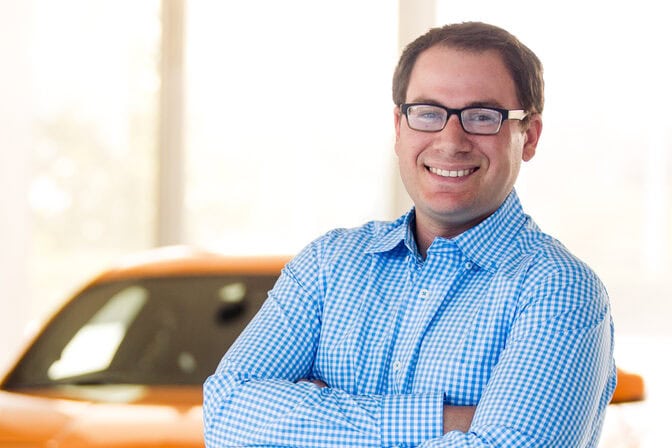
Building the future of automotive tech
Ira Goldberg (BS ME ‘12) is developing new EV technology in a revitalized Midwestern city.

Ira Goldberg (BS ME ‘12) is developing new EV technology in a revitalized Midwestern city.
Growing up a car-obsessed kid in the Philadelphia suburbs, Ira Goldberg always knew he wanted to work in the auto industry. So after high school, he felt pulled to the global center of vehicle technology, where he got a degree in mechanical engineering from U-M.
“I thought long and hard about what I wanted to be as an engineer,” he said. “And that passion I had for cars always just kept coming back to the forefront, especially with everything that Michigan and Detroit is really all about.”
Goldberg began his career a few miles from U-M at Ford Motor Company, where he developed components for a variety of vehicles including the Ford Mustang and Bronco before pivoting to battery engineering. He later moved west, to Normal Ill. and a job at Rivian, where today he is developing the next generation of EV technology as a manager of battery series engineering.
“It’s so important to be doing this work now,” Goldberg said. “It’s all in service of getting us to a point where EVs are accessible to everyone and the future of vehicle technology becomes much more efficient.”
While moving battery technology from concept to the factory floor is a big challenge, Goldberg has found fulfillment in its human aspects as well as in the technology.
“I think it’s really important as an engineer to understand how your ideas actually come together day in and day out,” he said. “Is it going the way you thought, or is someone really struggling? I’ve learned so much by seeing the pain points that people are having on the line.”
Goldberg said he was well-prepared for his current role by his time at U-M. His experience included mentoring students at the Michigan Engineering Zone (the MEZ), U-M’s robotics and STEM education center in Midtown Detroit.
“You’ve got eight to 10 high school students sitting in front of you, looking to you as sort of the leader,” he said. “And you really have to think ‘How do I get this group to work together in a way where I’m including everyone and getting the information across?’ Communication, especially among teams, is very critical in what I do now, and the MEZ really helped me build out my skills in that area.”
These days, Goldberg’s colleagues are also his neighbors in Normal, where Rivian rehabbed a shuttered Mitsubishi plant into its main manufacturing facility. The plant is the county’s second largest employer, and is being expanded to build Rivian’s next vehicle, the R2. The company is also building an industrial park to house suppliers nearby. Goldberg is proud to play a role in both the technology and the community it has spurred.
“We’re bringing in a lot of smart, talented people and really just contributing to the vibrancy of the town,” he said. “There are a lot of events that Rivian puts on as well as other things around town and I think it’s been beneficial for everybody.”